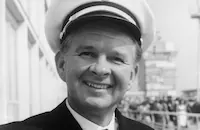I Dream of Jeanie (with the Light Brown Hair)
Cast & Crew
Allan Dwan
Ray Middleton
Bill Shirley
Muriel Lawrence
Eileen Christy
Rex Allen
Film Details
Technical Specs

Synopsis
In 1849, everyone is singing the popular new tune, "Oh! Susanna," except for Inez MacDowell, a classically trained singer who is returning home by steamboat to Cincinnati from her school in Pittsburgh. Her boyfriend, Stephen Foster, is expected to meet her at the steamboat, but on his way, he rescues his young friend Chitlins, when he is run over by a buggy. Chitlins needs hospital care, which Stephen pays for with $22 that he saved for Inez's engagement ring. Meanwhile, a musician, Milford Wilson, escorts Inez home, and when Stephen finally arrives at the MacDowells', Inez's younger sister Jeanie, who idolizes him, says that Inez is pouting in her room. Unable to placate Inez, Stephen goes to the MacDowells' stable, which has been fixed up as his living quarters, and entertains Jeanie with a polka he has named for her. When Inez joins them, Stephen proudly shows her that his song, "Oh! Susanna," has been printed. Although he has received neither money nor acknowledgment for it, Jeanie is impressed, but Inez is mortified that he is responsible for what she calls "childish effusion." At his brother Dunning's office, where he works as a bookkeeper while composing music in the ledgers, Stephen calculates the cost of providing for a wife, and works on a new song with a flute he keeps in his pocket. R. E. Howard, the musical publisher who first printed "Oh! Susanna," shows up, followed by the famous performer Edwin P. Christy. Both claim to have been swindled by Stephen, who, lacking business sense, has sent the song to many other publishers and performers. Though neither paid him, each considers himself the song's owner, and wants him to buy the song back. As Stephen calculates a life of indebtedness, Dunning arrives, having just bought the steamship James Millingar . Being a good businessman, Dunning quickly assesses Stephen's great talent, and after conferring with Christy, he and the singer visit Howard and negotiate a deal whereby Christy will popularize future Foster songs, Howard will print them and Stephen will be paid. Dunning invites Christy to Inez's house recital that evening, and once there, they go to Stephen's room to look over other songs written by Stephen, and disrupt Inez's performance with Christy's exuberant singing. Jeanie runs out to quiet the men, but Christy, who is unimpressed by Inez, crashes the recital and gives an impromptu rendering of Stephen's songs to the delight of the guests. Stephen is embarrassed by the attention, and consoles the pouting Inez by promising never to write again. In addition, he offers to take her to a Jenny Lind concert, but while they are getting the tickets the next day, Christy leads a parade down the street to advertise his new Christy's Minstrels show, which features Stephen's songs, and Stephen is whisked onto the parade buggy against his wishes. Embarrassed by Stephen's "vulgar" music, Inez soon turns to the willing Milford for comfort and musical companionship, and breaks with Stephen, who tells Jeanie that to him "all the lights in the world have just gone out." Uninterested in Christy's gala performance, he tears up his music while everyone except Inez attends the show, and heads down the Ohio River. That night, Jeanie realizes she is in love with Stephen, but his disappearance is not discovered until the next day. With the help of Stephen's dog, Tray, Dunning and Christy find evidence that Stephen left by rowboat. After chastising Inez for jilting the "greatest musical genius of this day," Christy vows to search the river towns for Stephen. Inez and Jeanie engage in a sisterly discussion, during which Jeanie reveals her love for Stephen, and Inez convinces their mother to take Jeanie with Dunning on his steamboat to search for Stephen. Jeanie suggests that Stephen has headed for places he dreams and writes about, so they ride south, and when they pass an old man singing one of Stephen's songs, they know they are on the right track. In Natchez, Jeanie hears Stephen's polka being played on a flute and follows the sound to a saloon where Stephen is performing. When Stephen is forced to defend Jeanie from the advances of a sailor, a saloon-wide brawl ensues, until Christy, who arrives with Dunning, calms the crowd with a chorus of Stephen's "The Glendy Burke." Later in a hotel room, Stephen remains ambivalent about a deal Dunning has negotiated on his behalf because he still thinks he loves Inez, who despises his music. However, at dusk he hears Jeanie singing one of his songs on the steamboat, and joins her. Realizing that the words to the song he has been trying to write for Inez "with the golden hair" are all wrong, he begins singing "I Dream of Jeanie with the Light Brown Hair."

Director

Allan Dwan
Cast
Ray Middleton
Bill Shirley
Muriel Lawrence
Eileen Christy

Rex Allen
Lynn Bari
Richard Simmons
Robert Neil
Andrew Tombes

James Dobson
Percy Helton
Glenn Turnbull

Louise Beavers

James Kirkwood

Carl Dean Switzer
Freddie Moultrie

Glenn Strange
Dick Alexander
Richard Reeves
Tommy Walker
Danny Jackson
Jimmy Moultrie
Jay Bankhead
Leslie Bennett
Peter Roman
Isabel Randolph
Crew
Fred Allen
Robert Armbruster
Robert Armbruster
Sir Henry Rowley Bishop
Don Brodie
T. A. Carman
Allan Dwan
Stephen Foster
Peggy Gray
Kenneth Holmes
Frank Hotaling
Reggie Lanning
Alan Lemay
Lee Lukather
Howard Lydecker
Theodore Lydecker
Bob Mark
John Mccarthy Jr.
Felix Mendelssohn
Nick Castle Company
Adele Palmer
James Redd
William Shakespeare
John A. Stransky Jr.
Howard Wilson
Herbert J. Yates

Film Details
Technical Specs

Quotes
Trivia
Notes
Working titles of the film were Song of Youth and Jeanie (with the Light Brown Hair). Eileen Christy's credit is followed by the statement: "and Presenting the Immortal Songs of Showboat Days." The film, which contains a recreation of a minstrel show, is loosely based on the early adulthood of Stephen Foster (1826-1864) who, like his screen depiction, played the flute and worked in Cincinnati as a bookkeeper for his brother Dunning. As shown in the film, Foster's song "Oh! Susanna" achieved great popularity and was the first of many songs associated with Edwin P. Christy (1815-1862). However, Foster was not acknowledged on the original sheet music, and some of his published songs credited Christy as composer and lyricist.
Foster is considered the first professional songwriter born in the United States, as he received royalties for his songs at a time when songwriters usually relinquished ownership rights upon payment of a nominal lump sum. However, near the end of his life he sold the rights to future songs to his publishers for a lump sum and died in poverty. Foster married Jane McDowell in 1850; however, they were rumored to have separated by 1853. Foster's song "Jeanie with the Light Brown Hair" was not written until 1854. Some of Foster's songs were interpolated into performances of the famous play mentioned in the film, Uncle Tom's Cabin, by Harriet Beecher Stowe. According to a modern source, as of 1850 Foster and Christy had not met in person as depicted in the film, as their business was transacted through the mail.
The company of white performers in blackface created around 1846 by Christy was not the first of its kind, but it established a performance format that was recognized into the twentieth century. Christy retired from the group in 1854 and was succeeded by George N. Harrington, who then used Christy's name professionally. According to December 1951 Hollywood Reporter news items, John Archer was originally cast in the role of Dunning Foster, but dropped out when he was hospitalized for an ulcer attack. I Dream of Jeanie marked Eileen Christy's film debut and cowboy star Rex Allen's first non-Western role. Two other films on the subject of Stephen Foster's life are the 1935 Mascot Pictures production of Harmony Lane, directed by Joseph Santley, and starring Douglas Montgomery as Foster and William Frawley as Christy; and the 1940 Twentieth Century-Fox production of Swanee River, directed by Sidney Lanfield, and starring Don Ameche as Foster and Al Jolson as Christy (see AFI Catalog of Feature Films, 1931-40).

Miscellaneous Notes
Released in United States Summer June 15, 1952
Released in United States Summer June 15, 1952











